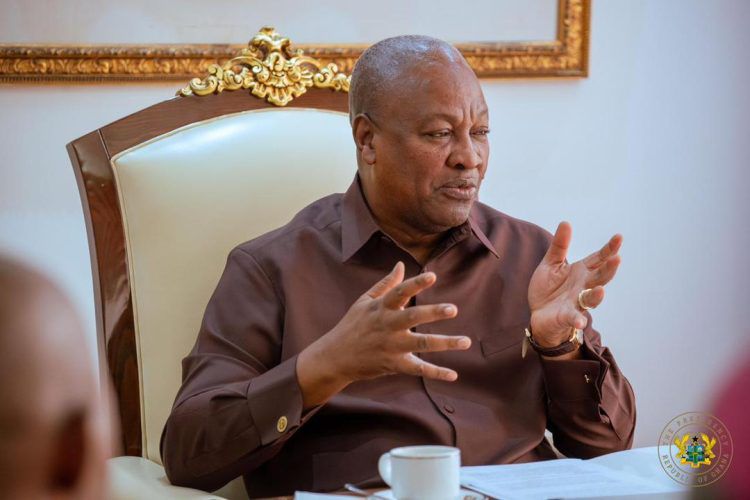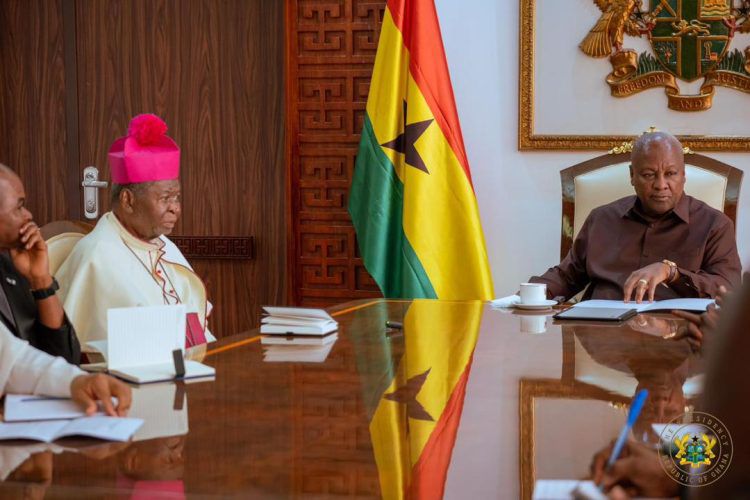President John Dramani Mahama has announced the government’s intention to construct a new regional hospital and a Catholic Science and Technology University in Damongo, the capital of the Savannah Region.
The announcement was made during a courtesy visit by the Catholic Metropolitan Archbishop of Tamale, Most Rev. Philip Naameh, to the Jubilee House in Accra. The proposed projects, according to the President, aim to strengthen healthcare delivery and expand access to higher education in northern Ghana — regions that continue to lag behind in tertiary infrastructure and medical training facilities.
President Mahama revealed that the new regional hospital will not only provide advanced medical services to residents of the Savannah Region but will also serve as a teaching hospital for the proposed university.
The Catholic Science and Technology University is expected to include a Faculty of Medical Sciences, designed to train doctors, nurses, and allied health professionals. According to the President, the project aligns with government’s broader agenda to decentralise healthcare delivery and improve access to medical education outside major cities like Accra and Kumasi.

“The hospital will serve as a dual-purpose facility — for patient care and for training the next generation of Ghanaian health professionals,” President Mahama stated.
Funding Support from China
The President disclosed that initial funding for the proposed university will come from a $30 million grant pledged by Chinese President Xi Jinping. He added that the grant is part of ongoing bilateral cooperation between Ghana and China, which has previously supported projects in education, energy, and infrastructure development.
China remains one of Ghana’s largest development partners, with recent investments in road construction, ICT, and renewable energy projects. Analysts believe that such partnerships have been crucial to bridging Ghana’s infrastructure financing gaps, especially in rural and newly created regions.

The idea for the Catholic Science and Technology University was originally proposed by Archbishop Philip Naameh, who has been a strong advocate for improving educational opportunities in northern Ghana. The Archbishop highlighted several social and educational challenges facing the region, including low access to tertiary institutions and limited job opportunities for young people.
He proposed Damongo as an ideal location due to its growing population, central position within the Savannah Region, and the availability of land for development.
“The Church has always been a partner in national development. This university will not only provide education but will instill values of discipline, innovation, and service,” Archbishop Naameh reportedly said during the meeting.
Ghana’s Catholic Church has a long-standing record of contributing to education, operating over 15 percent of the country’s basic schools and several colleges of education. The establishment of a faith-based science university in Damongo is expected to build on that legacy while responding to modern technological and healthcare needs.
President Mahama also used the meeting to reaffirm his government’s commitment to strengthening Technical and Vocational Education and Training (TVET) institutions across the country. He noted that modern economies rely heavily on skilled technical labour, and Ghana must invest in upgrading its human resource base to compete regionally.
“Our goal is to ensure that technical education becomes a core driver of industrial growth. The proposed university will complement existing TVET reforms by producing high-level professionals in applied science and engineering,” the President said.
Addressing Regional Development Gaps

The Savannah Region, one of Ghana’s newest administrative regions created in 2019, continues to face significant development disparities, particularly in health and education. Data from the Ghana Health Service indicates that the region currently has fewer than 250 doctors serving its entire population — one of the lowest doctor-to-patient ratios in the country.
The proposed hospital is therefore expected to improve healthcare accessibility while reducing the burden on referral facilities in Tamale and Wa.
Experts say such initiatives are critical for achieving Sustainable Development Goal (SDG) 3, which seeks to ensure healthy lives and promote well-being for all, and SDG 4, which focuses on quality education.
Several high-ranking government officials attended the discussions at the Presidency, including the Minister for Education, Haruna Iddrisu; Presidential Advisor and Special Aide, Joyce Bawah Mogtari; Elvis Afriyie Ankrah from the Office of the President; and Rita Naa Odoley Sowah, Deputy Minister for Local Government, Chieftaincy, and Religious Affairs.
The presence of these officials signaled strong inter-ministerial support for the Damongo projects, which are expected to be implemented under a public-private partnership framework involving the Catholic Church, the Ministry of Education, and international donors.

If completed, the Catholic Science and Technology University would become the first Catholic university in northern Ghana and one of the few tertiary institutions dedicated specifically to science, technology, and healthcare training.
Analysts have described the project as a potential game-changer for the region, which has long struggled with youth unemployment and limited access to tertiary education. The combination of a hospital and teaching university could spur local economic growth, create hundreds of jobs, and improve retention of health professionals in rural areas.
According to the 2023 Ghana Statistical Service report, nearly 60 percent of students from the northern sector migrate southward for tertiary education — a trend the Damongo university could help reverse.
The government has yet to release a detailed timeline for the commencement of the two projects. However, officials say feasibility studies are already underway to assess land requirements, cost estimates, and potential partnerships.
President Mahama emphasized that the initiative is part of a long-term vision to make every regional capital a hub of health and education excellence.
“As we build the next phase of Ghana’s development, our focus is on equity — ensuring that no region is left behind,” he concluded.
Read also: Attorney-General: Ghana Needs Strong Legal Case Before Seeking Ofori-Atta’s Extradition from U.S.

